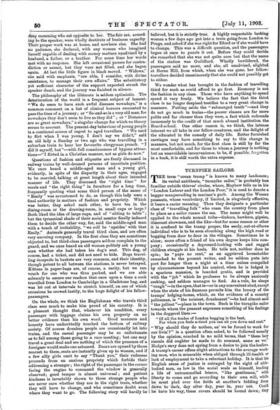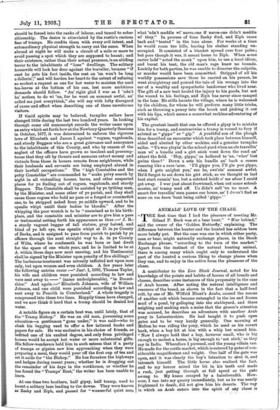TURNPIKE SAILORS.
THE term " ocean tramp " is known to many landsmen; its verbal antithesis, "turnpike sailor," is probably less familiar outside thieves' circles, where, Mayhew tells us in his "London Labour and the London Poor," it is used to denote a beggar masquerading in mariner's garb. Among the Wessex peasants, whose vocabulary, if limited, is singularly effective, it bears a racier meaning. Thus they designate a particular class of "travelling folk " who roam the country from place to place as a sailor roams the sea. The name might well be applied to the whole nomad tribe—tinkers, hawkers, gipsies, itinerant showmen, and the like—but for some reason or other it is confined to the tramp proper, the seedy, out-at-elbows individual who is to be seen slouching along the high road or begging from door to door in the villages. Sometimes he is alone; more often a friend of his own degree keeps him com- pany; occasionally a depressed-looking wife and ragged children straggle at his heels. He toils not, neither does he spin; he "pays no rent," as an aggrieved householder remarked to the present writer, and he seldom puts into port for longer than a night at a time unless compelled by circumstances beyond his control, when he is lodged in a spacious mansion, is boarded gratis, and is provided with the "job" which he professes to be always anxiously seeking, and seldom manages to find. As a rule, he sleeps "rough"—in the open, that is—or in any convenient shed, except when the state of his finances permits him the luxury of the tramps' lodging-house, which, on the evidence of a country policeman, is " the noisiest, drunkenest "—he had almost said " the jolliest "—place in the town. Such is the turnpike sailor towards whom the peasant expresses something of his feelings in the doggerel lines :— " Of all the trades of London begging is the best,
For when you feels a-tired you can sit you down and rest."
" Why should they do nothen, an' we be forced to work fur our livin'?" is a question often asked, to be followed usually by the opinion, couched in no mild terms, that " them lazy rascals did oughter be made to do summat, same as we." Hodge's envy does not spring from a desire to join the loafers.
A tramp's career offers slight attractions to the average work- ing man, who is miserable when obliged through ill-health or lack of employment to take a reluctant holiday. It is that his English sense of justice is outraged by the sight of able- bodied men, as low in the social scale as himself, leading a life of untrammelled leisure, "like gentlemen," with liberty to come and go according to their own will, while he must plod over the fields at another's bidding from dawn to dark, day after day, year in, year out. Could he have his way, these rovers should be bound down; they should be forced into the ranks of labour, and tamed to sober citizenship. The desire is stimulated by the rustic's curious fear of tramps. He credits them with every evil intent, and extraordinary physical strength to carry out the same. When abroad at night he will make a circuit of a mile or more to avoid passing a spot which they are supposed to haunt ; and their existence, rather than their actual presence, is an abiding terror to the inhabitants of "lone" dwellings. The solitary housewife will lock her door against the traveller, because " if oast he gets his foot inside, the rest on 'im wun't be long a-follerin'," and will harden her heart to the extent of refusing so modest a request as one for hot water to moisten the used tea-leaves at the bottom of his can, lest more ambitious demands should follow. "An' right glad I wur as I 'udn't ha' nothen to do wi 'un, fur he went on summat awful, an' called ma just everythink," she will say with lofty disregard of cause and effect when describing one of these unwelcome visitors.
If timid spirits may be believed, turnpike sailors have changed little during the last two hundred years. In looking through some old manuscript records the writer came upon an entry which set forth how at the Newbury Quarterly Sessions in October, 1677, it was determined to enforce the rigorous laws of Elizabeth and James I. against "rogues, vagabonds, and sturdy Beggars who are a great grievance and annoyance to the inhabitants of this County, and who by reason of the neglect of the officers have grown so insolent and presump- tuous that they oft by threats and menaces extort money and victuals from those in houses remote from neighbours, while their husbands and servants are being employed abroad in their lawfull occupations." The " high Constables and the petty Constables " are commanded to " make privy search by night in all victualling houses, barns, and other suspected places for ye finding out of rogues, vagabonds, and sturdy Beggars. The Constable shall be assisted by ye tything men, by the Minister, and some other of ye parish, and they shall cause those rogues who hold no pass or a forged or counterfeit one, to be stripped naked from ye middle upward, and to be openlie whipt untill their bodies be bloodie." After the whipping the poor wretch is to be " examined as to his birth- place, and the constable and minister are to give him a pass or testimonial setting forth his appearance as thus J. R., a sturdy vagrant beggar of tall stature, gray haired, and blind of ye left eye, was openlie whipt at D. in ye County of Berks, and is assigned to pass from parish to parish by ye officers through the next straight way to A. in ye County of Wilts, where he confesseth he was born or last dwelt for the space of one whole year, and he is limited to be at A. within three days now next ensuing, and his Testimonial shall be signed by the Minister upon penalty of five shillings."' The barbarous treatment was actually inflicted not upon men only, but upon women and even children. A few years later the following entries occur :—" Jan?. 1, 1682, Thomas Taylor, his wife and children were punished according to law and were sent away to —" (name undecipherable), "in Dorset- shire." And again :—" Elizabeth Johnson, wife of William Johnson, and one child were punished according to law and sent away to Penrith in Cumberland." A whole tragedy is compressed into these two lines. Happily times have changed, and we now think it hard that a tramp should be denied hot water.
A notable figure on a certain beat was, until lately, that of the " Tramp Bishop." He was an old man, possessing some education—a gentleman "gone under," it was said—who to cloak his begging used to offer a few tattered books and papers for sale. He was exclusive in his choice of friends, as befitted one of his exalted degree, and only from privileged houses would he accept hot water or more substantial gifts. His fellow-wanderers held him in such esteem that if a party of tramps or gipsies saw him approaching when they were preparing a meal, they would pour off the first cup of tea and set it aside for " the Bishop." He has forsaken the highways and hedges during recent years ; whether he is dragging out the remainder of his days in the workhouse, or whether he has found the " Tramps' Rest," the writer has been unable to learn.
At one time two brothers, half gipsy, half tramp, used to haunt a solitary lane leading to the downs. They were known as Zeeky and Ziph, and passed for " wunnerful quiet men what 'udn't meddle wi' narra-one if narra-one didn't meddle wi' they." In process of time Zeeky died, and Ziph came back and " tented " in the lane alone. For weeks at a time he would roam the hills, leaving his shelter standing un- occupied. It consisted of a blanket spread over four poles ; but poor though it was, it meant home to Ziph. When some carter lade" acted the monk " upon him, to use a local idiom, and burnt his tent, the old man's rage knew no bounds. Luckily for both parties, he was unable to discover the culprits, or murder would have been committed. Stripped of all his worldly possessions save those he carried on his person, he went straightway and poured the tale of his wrongs into the ear of a wealthy and sympathetic landowner who lived near. The gift of a new tent healed the injury to his goods, but not the wound to his feelings, and Ziph has never since camped in the lane. He stills haunts the village, where he is welcomed by the children, for whom he will perform many little tricks, such as throwing a penny into the brook and picking it out with his lips, which seems a somewhat reckless adventuring of his capital.
The greatest insult that can be offered a gipsy is to mistake him for a tramp, and contrariwise a tramp is roused to fury if saluted as " gippo" or " gip." A youthful son of the plough thus described an encounter which took place between himself, aided and abetted by other urchins, and a genuine turnpike sailor. "Us wur playin' in the school-yard when an ole travellin' man wi' a bundle and a girt stick went down the road an' athert the field. ' Hey, gippo,' us hollered to 'un, wher' bist gwine then ? ' Down a sets his bundle an' back a comes running like a race-'arse. 'I'll gippo you, I'll gie you gippo, when I gets anighst you,' sez he, swe'rin' aummat awful. He'd furgot to set down his girt stick, so we thought us had best start runnin' too, but a cached holdt o' me afoor I could get away. I wur just about frowtened, when out come school- master, an' tramp med off. Us didn't call 'un no moor. A smart few travellin' men passes our house, an' I dwun't find as none on um keers 'bout being called gippo.'







































 Previous page
Previous page